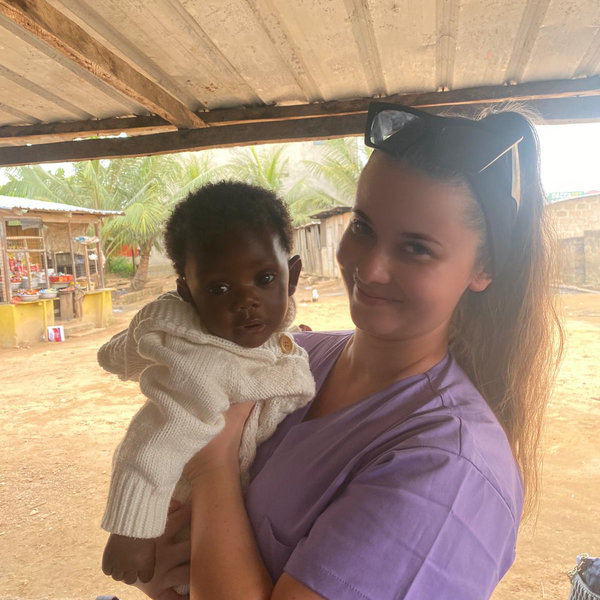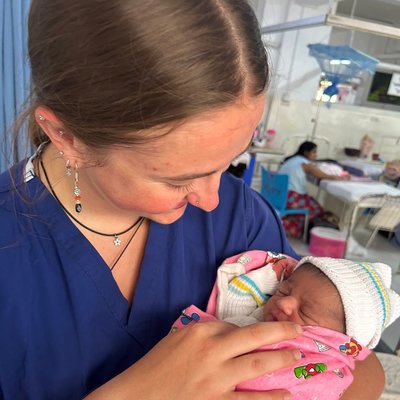Sheffield Hallam University 2018
 Undertaking a placement abroad was a once-in-a-lifetime opportunity to experience a different country's healthcare system and culture. So, I travelled to Dar es Salaam with Work the World.
Undertaking a placement abroad was a once-in-a-lifetime opportunity to experience a different country's healthcare system and culture. So, I travelled to Dar es Salaam with Work the World.
I chose Dar es Salaam because I sponsor a child in Tanzania and this was probably my only chance to visit her. When I discussed this with Work the World staff before my departure, they reassured me that my weekends were free to travel and explore.
Before I left for Tanzania, the Work the World team and I discussed my placement and what I should expect. I threw them challenges with my unusual course and set of interests, but Work the World brilliantly tailored my placement to suit my clinical interests. We agreed that over my two-week placement I’d spend time in three departments, covering different elements of paediatrics, public health and maternity care.
The time between registering onto the programme and stepping onto the plane went so quickly!
I was nervous to travel on my own. But with the help of Work the World it was much easier than expected. I always felt safe.

When I arrived in country, I met a student who landed at a similar time to me. We had an induction from the Work the World team who put us at ease with their friendly nature and great advice.
The team and the other students at the house made it so easy to settle in. It was the first time I had travelled abroad alone, and I was nervous. But it turned out I didn't need to worry. The staff in the house were always friendly, helpful and so much fun! They were always around when we needed to ask a question or wanted a chat.
On my first day, the students in the house took me under their wing and we went together on a trip to Kariakoo market. Fully immersing myself in local culture from the get go was amazing. Thankfully, the other students had a few weeks experience (and a bit of Swahili) under their belts already.
 The weekly barbeque nights were a highlight. Eating together with all the students and staff and having a dance with them bonded us. I also enjoyed our weekly Swahili lessons—the teacher had so much knowledge and experience, making the lessons really enjoyable.
The weekly barbeque nights were a highlight. Eating together with all the students and staff and having a dance with them bonded us. I also enjoyed our weekly Swahili lessons—the teacher had so much knowledge and experience, making the lessons really enjoyable.
When I first stepped into my placement hospital, the differences hit me straight away. I reflected on how differently local staff worked and how patients were treated compared with at home in the UK. But it was important to remember the healthcare system in Tanzania was still developing, and resources were low.
Departments ran with very few staff, and they were focussed on delivering the treatment required with minimal resources. Patients had to pay for care and also had to bring certain medical supplies with them to the hospital.
Patients were grateful to be seen by a doctor or a nurse even though standards were so different to what we would accept in the UK. It challenged my view on what ‘acceptable’ care looked like, and how grateful we should be for the NHS.
Every evening, when I returned to the house from placement, it was great to chat with the other students about what we had each been up to that day.
Although we were studying different things and based in different departments, the surprises in the hospital were real for all of us. I appreciated discussing the highlights and challenges of placement with people who were in the same boat as me.
 The patients I cared for spoke only Swahili, but most of the local staff had a good level of English. The staff involved me in clinical tasks and taught me how they did things. I got to be as involved as I felt comfortable with, and although I was only there for a short time I built good working relationships with the doctors and nurses.
The patients I cared for spoke only Swahili, but most of the local staff had a good level of English. The staff involved me in clinical tasks and taught me how they did things. I got to be as involved as I felt comfortable with, and although I was only there for a short time I built good working relationships with the doctors and nurses.
In the Paediatric Outpatient Department, I registered patients, learned how to ask essential questions in Swahili, and input answers into the department's computer system. I also measured children's vital signs and weighed them before they saw the doctors.
In the neonatal ward, I prepared equipment, fed babies, provided hygiene care, and assisted doctors on their rounds.
Finally, on the labour ward, I observed midwives delivering babies, assisted in administering medication, and catheterised patients. I spoke very little Swahili, but it was amazing how I could connect with patients through basic phrases, gestures and facial expressions alone.
I only had one full weekend during my two weeks in Tanzania, and I had already planned to travel to another city to visit my sponsor child. The other housemates that had more weekends to spare travelled to places like Zanzibar Island or on safari.
 I did get to spend some time exploring with my housemates. My favourite trip was on my very last day, my housemates and I took a boat to Bongoyo—a beautiful deserted island. We then went and had an incredible dinner whilst listening to a live band by the ocean.
I did get to spend some time exploring with my housemates. My favourite trip was on my very last day, my housemates and I took a boat to Bongoyo—a beautiful deserted island. We then went and had an incredible dinner whilst listening to a live band by the ocean.
I would encourage anyone considering a placement with Work the World to just do it. It was an incredible experience, and although I went alone I met some amazing people. I came home with some great stories to share with family and friends.
Since being back in the UK, I have had the opportunity to share my learning with colleagues and university lecturers and have even been invited to speak at an interprofessional training event.
In the end the most important lessons I learnt were about who I was as a person and what I was capable of. And I came away feeling a deep appreciation for what I have at home, both personally and professionally.







